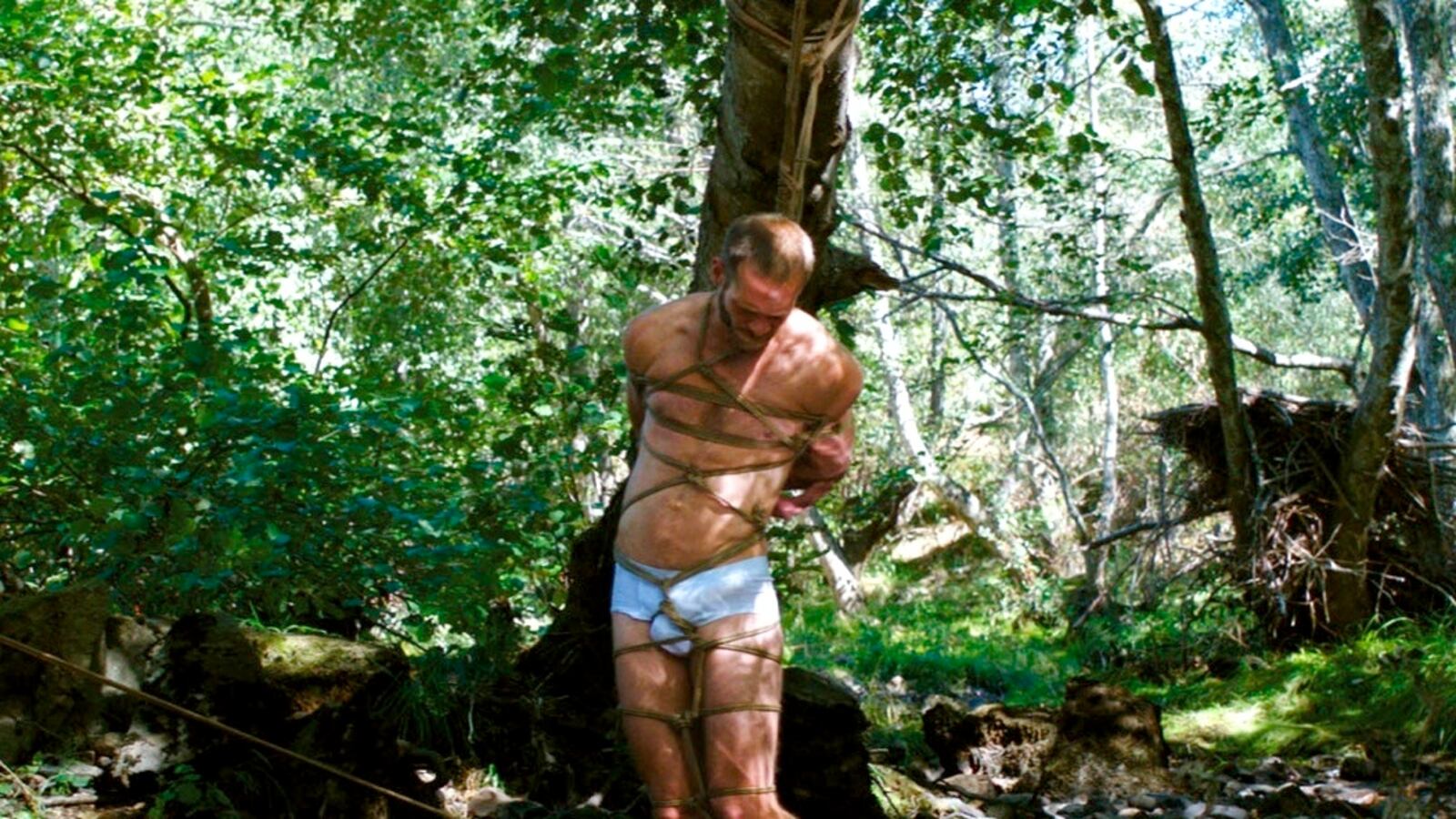A man swims along a Northern Portugal river, using clean, precise strokes to harmoniously move through the water. He stops to watch the many different species of birds that live along this remote route, from hawks and vultures to—most important to him—endangered black storks that are nesting nearby. We see what he sees through his binoculars, although later on, we’ll also see what they see—namely, this ornithologist, named Fernando (Paul Hamy), looking small and alone from the birds’ aerial vantage points. On a riverbank, he tries to communicate with his boyfriend via cell phone, but reception is bad, and he manages to do little more than say that he loves him, and acknowledge that he’s received the reminder to take his medication. Then he gets into his kayak, gets caught in rapids, and disappears.
Such is the set-up for The Ornithologist, an equally pious and profane drama from Portuguese director João Pedro Rodrigues that—like the filmmaker’s prior effort, 2013’s The Last Time I Saw Macao—is mesmerizing, baffling, and more or less impenetrable without some working knowledge of the material that inspired it. In this case, that would be the legend of Saint Anthony of Padua, a famed 13th century Catholic priest and Franciscan friar who, after crashing his boat on his way home from Morocco and washing up in Sicily, spent years teaching across the region, eventually settling in Padua and earning his reputation as the patron saint of lost things. Saint Anthony is central to Rodrigues’ import, given that the man’s life holds the key to understanding at least some of its allegorical mysteries. Still, trying to make lucid heads or tails of this surreal odyssey is, I think, ultimately the wrong way to approach it.
Rather, The Ornithologist is best experienced with an open mind and a willingness (if not eagerness) to get lost inside its strange, beguiling world. If its intro passages suggest a relatively clear-cut update of Saint Anthony’s story—albeit one filtered through the filmmaker’s own highly personal lens—the material soon takes a decidedly more bizarre turn. After Fernando vanishes, Rodrigues cuts to two female Chinese hikers, Lin (Chan Suan) and Fei (Han Wen), traipsing through the misty forest that surrounds the river. A few moments later, Lin speeds ahead, so she can jump out from behind a tree to scare Fei. She then discovers blood on her injured knee—which Fei first licks off of Lin’s finger, and next sucks up, directly from the wound. “That’s enough,” Lin finally chides, and they proceed on.
This incident unhinges the proceedings (to put it mildly), which soon reveal that Lin and Fei are lost. “This forest never ends. St. Anthony has abandoned us,” they lament. Yet their fortunes change when they discover a waterlogged, but still alive, Fernando. They nurse him back to health, feed him, and warm him with an ancient Chinese tea. Around a campfire, they have a conversation in which Lin and Fei express fear over the devilish spirits they’ve heard the past three nights, and Fernando states that he doesn’t believe in God. Shortly thereafter, the women retreat to their tent (“Like good Christian girls, we sleep together”), leaving Fernando to sleep outside.
In the morning, he wakes up in just his underwear, his body hanging upright from a tree via ropes that are wrapped around his entire body—including, in a particularly uncomfortable manner, his genitals.
As you might imagine, Fernando isn’t too thrilled with this state of affairs, and following a testy exchange with Lin and Fei (during which he calls them “crazy bitches” and “sick sadists” and spits on them), he frees himself under cover of night, hearing—as he sneaks away—the two giggling in their tent, “Tomorrow we’ll castrate him!” Having escaped that terrible fate, he ventures back into the great forest, where he finds only more bewildering and frightening sights. First, it’s his broken kayak, stuck upright in the sand and decorated with balloons as if for use in some sort of strange ritual, and his emptied backpack and ID nearby, his eyes burned out of the latter. Later, in the dark, he spies men dressed in ornate masks and tasseled costumes running to and fro with torches, yelling about their power and capturing a wild hog that they apparently intend to sacrifice.

A scene from 'The Ornithologist,' directed by João Pedro Rodrigues.
Strand ReleasingIf that weren’t enough weirdness, he some time later encounters a deaf-mute goat shepherd (Xelo Cagiao). Introduced sucking from one of his animal’s teats, this stranger draws his name in the sand as “Jesus” and proceeds to have rolling-around-on-the-beach sex with Fernando. It’s here that The Ornithologist most plainly comingles the personal and the spiritual in overtly blasphemous ways. Yet it’s clear that Rodrigues’ aim isn’t to offend or titillate so much as to cast Fernando’s rambling journey—toward escape, toward enlightenment, toward salvation—in terms that symbolically relate to his own individual life. Be it an ensuing fight between Fernando and Jesus in which the former stabs the latter to death (in the side, à la Christ), or a montage in which cascading water is layered on top of portraits of Fernando, Jesus, and a Christ statue, the film becomes dreamier and more free-flowing, proceeding forward with a haziness that would be off-putting if every stop along its path weren’t so rapturously conceived—courtesy of an aesthetic attuned to the area’s enveloping natural sounds—and tantalizingly oblique.
To be sure, The Ornithologist is a challenging work that doesn’t provide easy answers – and, in fact, requires that one accept that its highly sexualized enigmas (fingers entering and exiting bodily gashes; bodily transformations; topless female riflewomen on horseback, beating their chests and crying out in celebration) aren’t necessarily altogether decodable. “There are certain things we shouldn’t try to understand. They come to pass and we must believe in them,” says Fernando toward story’s end, and it’s a lesson Rodrigues demands we heed. Less a straightforward drama than a winding, haunting reverie about a lost outsider searching for acceptance and companionship—in terms of both the flesh and the spirit—it glides along to the beat of its own strange drum, its strident string score evoking terror, and its unhurried visuals exuding trancelike beauty. It’s a film about the universal desire for greater understanding (of ourselves, and the world around us) that itself is, in a sense, incomprehensible. Intrepid moviegoers would be wise to fall under its spell.






